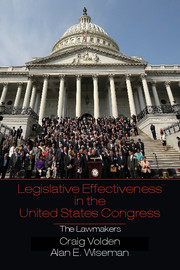Book contents
- Frontmatter
- Contents
- List of Tables and Figures
- Acknowledgments
- 1 Introduction
- 2 Measuring Legislative Effectiveness
- 3 The Keys to Majority-Party Effectiveness in Congress
- 4 A Tale of Three Minorities
- 5 Gridlock and Effective Lawmaking, Issue by Issue
- 6 The Habits of Highly Effective Lawmakers
- 7 The Future of Legislative Effectiveness
- References
- Index
- References
7 - The Future of Legislative Effectiveness
Published online by Cambridge University Press: 05 November 2014
- Frontmatter
- Contents
- List of Tables and Figures
- Acknowledgments
- 1 Introduction
- 2 Measuring Legislative Effectiveness
- 3 The Keys to Majority-Party Effectiveness in Congress
- 4 A Tale of Three Minorities
- 5 Gridlock and Effective Lawmaking, Issue by Issue
- 6 The Habits of Highly Effective Lawmakers
- 7 The Future of Legislative Effectiveness
- References
- Index
- References
Summary
“Well, Doctor, what have we got – a Republic or a Monarchy?” “A Republic, if you can keep it.”
– An exchange with Benjamin Franklin, at the close of the Constitutional Convention of 1787“The House of Representatives is very human. It is a responsive audience; it can be moved to tears and give itself up to laughter, but its mood is merely of the moment. The clamor of party bitterness can be hushed or laughed at under the magic of the skilled orator, and when his voice no longer charms or amuses, passion again rages. It is a curious assemblage, this House of ours.”
– Speaker of the House Joseph “Uncle Joe” Cannon (R-IL)The U.S. Congress is a remarkable and uncommon institution of representative democracy. Far more common are parliaments with electoral systems based on proportional representation. In many such systems, party members are placed on a list for elections. How many members off that list are selected into the parliament depends on their party’s proportional vote nationwide. The parties in parliament work to form governing coalitions, appointing the prime minister and cabinet. And that government’s leaders and bureaucrats then formulate the policies to be approved by the parliament, typically on party-line votes. For who would want to vote against his party and be left off the party list in the next election?
In contrast, in the U.S. Congress, each seat is won by an individual, perhaps aided by her party, but perhaps not. These legislators do not appoint the executive, nor do they serve as mere rubber stamps for policies handed down from the president. Rather, policies come from these members themselves – members who are closely linked to their constituents through a tight electoral connection. These representatives take ideas from their past experiences, from their constituents, or from other interested groups and individuals, formulate them into bills, and help shepherd those bills through committees, onto the legislative calendar for the chamber, through a final passage vote, and into law.
- Type
- Chapter
- Information
- Legislative Effectiveness in the United States CongressThe Lawmakers, pp. 197 - 210Publisher: Cambridge University PressPrint publication year: 2014



